Anna Bolena: Act I Finale — Anna Netrebko (Met Opera)
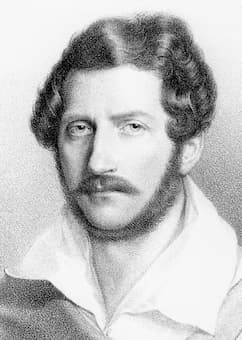
Gaetano Donizetti
During an extended apprenticeship lasting the better part of a decade, Gaetano Donizetti (1797-1848) composed in the region of 30 operas. However, his national and international reputation was firmly established only with his 31st effort, the opera Anna Bolena. First performed on 26 December 1830 in a special carnival season at the Teatro Carcano in Milan, Donizetti had to share the stage with the première of Bellini’s La sonnambula. Nonetheless, Anna Bolena was an overwhelming success, and according to an anecdote, it prompted Donizetti’s teacher Johann Simon Mayr to “address his former student as Maestro.” The opera was quickly given in Paris and London, and by 1839 it had reached the Théâtre d’Orléans in the United States. For Donizetti, Anna Bolena was a game changer as he cast off the long shadow of Rossini. Although he was acutely aware of the influence wielded by Bellini, Anna Bolena was “a logical extension of directions that Donizetti had already explored… it is more a product of a self-motivated maturation than had been recognized.”
Gaetano Donizetti: Anna Bolena – Act I Scene 5: Tutta in voi la luce mia (Samuel Ramey, bass; Bernadette Manca di Nissa, mezzo-soprano; Welsh National Opera Orchestra; Ricahrd Bonynge, cond.)
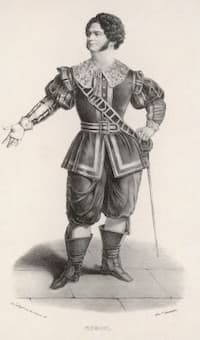
Giovanni Rubini in Anna Bolena 1830
Anna Bolena is one of four operas by Donizetti dealing with the Tudor period in English history, which also include “Il castello di Kenilworth of 1829,” Maria Stuarda of 1834/35, and Roberto Devereux of 1837. Felice Romani wrote the Italian libretto recounting the life of Anne Boleyn, the second wife of England’s King Henry VIII. Henry VIII has ruled England powerfully for 27 years when, bored by his first wife and numerous mistresses, he falls in love with the 24-year-old Anne Boleyn and makes her his second wife. But in the meantime this passion has also cooled off and Henry has already chosen Anne’s confidante Jane Seymour as his new favorite.
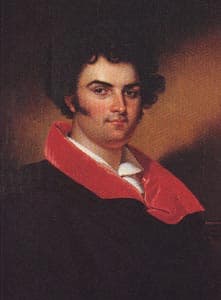
Giovanni Rubini
In his search for a way out of his marriage with Anne, the monarch devises a deceitful plan to accuse her of betraying him. Henry sees his opportunity when Lord Percy, Anne’s former lover, arrives at Windsor Castle. Meanwhile, the page and household musician Smeton is in love with Anne, and he has stolen a locket containing a portrait of the queen, which he seeks to return. Anne begs Percy to find another love, and when he draws his sword to kill himself, Smeton rushes forward and Henry bursts in and orders their arrests. Smeton protests Anne’s innocence but accidently drops the locket.
Gaetano Donizetti: Anna Bolena – Act I Scene 16: Tace ognuno, e ognun tremante! (Samuel Ramey, bass; Bernadette Manca di Nissa, mezzo-soprano; Jerry Hadley, tenor; Joan Sutherland, soprano; Giorgio Surjan, bass; Susanne Mentzer, mezzo-soprano; Welsh National Opera Orchestra; Richard Bonynge, cond.)
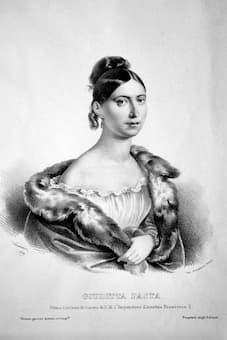
Giuditta Pasta
Jane Seymour tells Anne that the king will spare her if she confesses to loving Percy. When she lets slip that Henry loves another woman, Anne demands to know the identity. Overcome by emotions, Jane confesses. At the trial Smeton admits to being Anne’s lover, hoping to save her life. His plan backfires, and it seals Anne’s fate. Jane pleads with the king to spare Anne’s life, and Percy and Rochefort—Anne’s brother—refuse clemency.
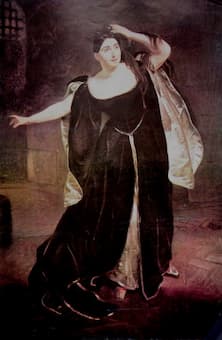
Actress Juditta Pasta as Anna Boleyn
In her cell, Anne recalls her girlhood love for Percy, and when the king’s new marriage is announced, Anne calls on heaven to have mercy on them. The cast at the première of Anna Bolena, Giuditta Pasta and Giovanni Rubini, had a significant influence on the maturation of Donizetti’s musical style. “Much of the score was composed during a month Donizetti spent at Pasta’s home on Lake Como, and it seems likely that the soprano offered a good deal of practical input during this visit, as she was also to do with several of Bellini’s operas. Rubini, too, was a powerful shaping force on Donizetti’s projects.”
Gaetano Donizetti: Anna Bolena – Act II Scene 12: Al dolce guidami (Joan Sutherland, soprano; Welsh National Opera Chorus; Welsh National Opera Orchestra; Richard Bonynge, cond.)
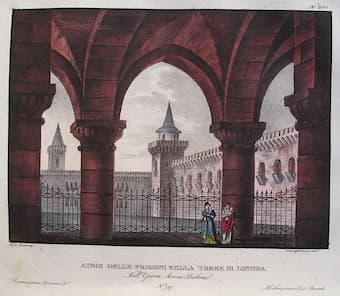
Set design by Alessandro Sanquirico for the premiere of Anna Bolena
With Anna Bolena Donizetti had come of age as a composer, and it also instilled a new level of professional confidence. He forcefully scolded the impresario Allesandro Lanari for supposedly restricting his opportunities for advancement in Paris. Concordantly, he complains to the publisher Giovanni Ricordi over performances of his operas from pirated scores. We can also sense his growing confidence in a series of letters to Jacopo Ferretti, librettist of Il furioso and Torquato Tasso. Ferretti was one of very few poets with whom Donizetti exchanged views on operatic aesthetics. “Donizetti’s letters to Ferretti combine brow-beating and playful dialogue, attesting to his close involvement with the details of his librettos. The composer offers comments and corrections to individual lines, often requesting what he calls ‘castrations,’ and reminding Ferretti repeatedly that brevity is all, that ‘success consists of doing little and making that little beautiful, and of not singing a lot and boring the audience’.”
For more of the best in classical music, sign up to our E-Newsletter
Gaetano Donizetti: Anna Bolena – Act II Scene 13: Coppia iniqua, l’estrema vendetta (Joan Sutherland, soprano; Giorgio Surjan, bass; Bernadette Manca di Nissa, mezzo-soprano; Jerry Hadley, tenor; Welsh National Opera Chorus; Welsh National Opera Orchestra; Richard Bonynge, cond.)
